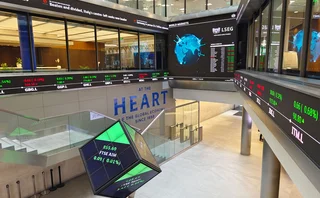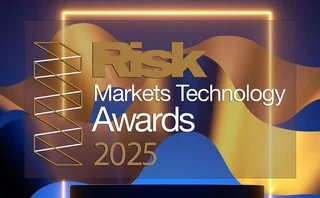
Index provider of the year: Bloomberg
Risk Awards 2018: Indexer is helping boost liquidity with new China indexes and standardised swaps

Steve Berkley, head of Bloomberg’s index business, believes so firmly in the company’s potential to disrupt the sector, he came out of retirement last year when it bought Barclays’ indexing business.
The acquisition was a strategic play by Bloomberg on the growing popularity of passive investment strategies that rely on benchmarks such as the Barclays US Aggregate Index (the Agg). All the top 100 asset managers are Bloomberg clients, and there are currently more than 260 exchange-traded funds linked to Bloomberg Barclays indexes.
Berkley previously headed the index group at Lehman Brothers for almost two decades until it was acquired by Barclays in the wake of the financial crisis. Now, he’s back at the helm of the widely used fixed-income benchmarks and – among other things – is helping bring liquidity to previously illiquid credit markets.
In March, the firm launched two new fixed-income indexes that include renminbi-denominated China government bonds for the first time: the Global Aggregate Plus China Index and Emerging Market Local Currency Government Plus China Index.
China currently represents around 5% of the global bond market by issuance, but renminbi-denominated securities are not eligible to be included in the Global Agg because they do not meet basic conditions for inclusion, such as hedgeability and being denominated in a freely trading currency.
A number of reforms are currently being introduced in China to make the bonds eligible for inclusion, but Bloomberg wanted to give investors a chance to see what the market would look like when Chinese securities will be included.
“We foreshadowed what the world will look like. It was a key event and it shook people up a little bit to realise, ‘hey, this train is coming’,” Berkley says.
“Once China goes into the Global Agg, it will be a fully fledged member, and passive investors, who benchmark against the index, will be forced to buy these securities. If they choose not to, they’re making a bet against the currency…so that is when I think the fun begins.”
We’ve opened up and made our indices available to all the dealers, and given that it’s the most popular fixed income family by far in the world, it is the first step towards bringing greater liquidity and efficiency to the markets
Steve Berkley, Bloomberg
Also in March, Bloomberg released the first standardised total return swaps on the Agg, to provide synthetic exposure to the underlying cash bonds in the US Corporate Investment Grade and US High Yield indexes.
The launch was the first time standardised contracts on the previously bank-owned indexes became available to a wider market of dealers and investors. By offering standardised contracts, dealers can now actively make markets in the swaps, while investors will be able to enter and exit total return swaps on a short-term basis, which in turn is going to create liquidity, says Berkley.
“We’ve opened up and made our indices available to all the dealers, and given that it’s the most popular fixed income family by far in the world, it is the first step towards bringing greater liquidity and efficiency to the markets. Traders can follow them all throughout the day and engage because markets are being made, and as people get comfortable with it, we plan to create more and more standardised products,” he adds.
Bloomberg plans to extend the number of standardised contracts available in US corporates, as well as to non-dollar indexes, emerging markets and other fixed-income asset classes such as municipals. “Once the factory is in place for trading these things, I think you can expand the acceptance and use of total return swaps rapidly,” Berkley adds.
On April 1, Bloomberg faced its first index reconstitution when 1,023 smaller, illiquid bonds with a combined market value of $304 billion were removed from the Agg, as a result of a rule change that raised the minimum outstanding value of government and corporate bonds eligible for inclusion in the index from $250 million to $300 million. Some critics said bond market liquidity would be tested, but the process occurred without a glitch.
Customer engagement
In fact, investors are quick to praise the company’s efforts to engage customers in decisions relating to the index, specifically Bloomberg’s Index Advisory Council, which convenes several times a year to hear feedback and suggestions from the industry.
A self-confessed “index geek”, Berkley has a clear vision about where the company can bring liquidity to the fixed-income markets, and most importantly, understands the value of getting his customers to truly care about the future of the indexes.
“I came out of retirement because I understood the power of Bloomberg and what it could mean in the index space. For an index person, this is the place to be,” he says.
Berkley understands that at its heart, Bloomberg is a technology company, and the success of the company as an index provider over the past 12 months is largely due to the firm’s ability to provide new data and analytics around the benchmarks. Bloomberg has opened access to some historical data such as performance and index constituent data, where access was previously limited, for example, and is testing a custom index generation tool to enable users to create, back test and publish bespoke indexes.
“Bringing the Barclays indexes businesses into Bloomberg means we can broaden our data and analytics offering for portfolio and risk managers,” Berkley says. “Bloomberg’s pricing service, BVAL, now supplies prices for the vast majority of the Bloomberg Barclays Indices, enabling portfolio managers to accurately and consistently evaluate the performance of their portfolios versus their benchmarks,” he adds.
Only users who have a paid subscription or are part of a corporate subscription are able to print or copy content.
To access these options, along with all other subscription benefits, please contact info@risk.net or view our subscription options here: http://subscriptions.risk.net/subscribe
You are currently unable to print this content. Please contact info@risk.net to find out more.
You are currently unable to copy this content. Please contact info@risk.net to find out more.
Copyright Infopro Digital Limited. All rights reserved.
As outlined in our terms and conditions, https://www.infopro-digital.com/terms-and-conditions/subscriptions/ (point 2.4), printing is limited to a single copy.
If you would like to purchase additional rights please email info@risk.net
Copyright Infopro Digital Limited. All rights reserved.
You may share this content using our article tools. As outlined in our terms and conditions, https://www.infopro-digital.com/terms-and-conditions/subscriptions/ (clause 2.4), an Authorised User may only make one copy of the materials for their own personal use. You must also comply with the restrictions in clause 2.5.
If you would like to purchase additional rights please email info@risk.net
More on Awards
Clearing house of the year: LCH
Risk Awards 2025: LCH outshines rivals in its commitment to innovation and co-operation with clearing members
Best use of machine learning/AI: CompatibL
CompatibL’s groundbreaking use of LLMs for automated trade entry earned the Best use of machine learning/AI award at the 2025 Risk Markets Technology Awards, redefining speed and reliability in what-if analytics
Markets Technology Awards 2025 winners’ review
Vendors jockeying for position in this year’s MTAs, as banks and regulators take aim at counterparty blind spots
Equity derivatives house of the year: Bank of America
Risk Awards 2025: Bank gains plaudits – and profits – with enhanced product range, including new variants of short-vol structures and equity dispersion
Law firm of the year: Linklaters
Risk Awards 2025: Law firm’s work helped buttress markets for credit derivatives, clearing and digital assets
Derivatives house of the year: UBS
Risk Awards 2025: Mega-merger expected to add $1 billion to markets revenues, via 30 integration projects
Interest rate derivatives house of the year: JP Morgan
Risk Awards 2025: Steepener hedges and Spire novations helped clients navigate shifting rates regime
Currency derivatives house of the year: UBS
Risk Awards 2025: Access to wealth management client base helped Swiss bank to recycle volatility and provide accurate pricing for a range of FX structures







